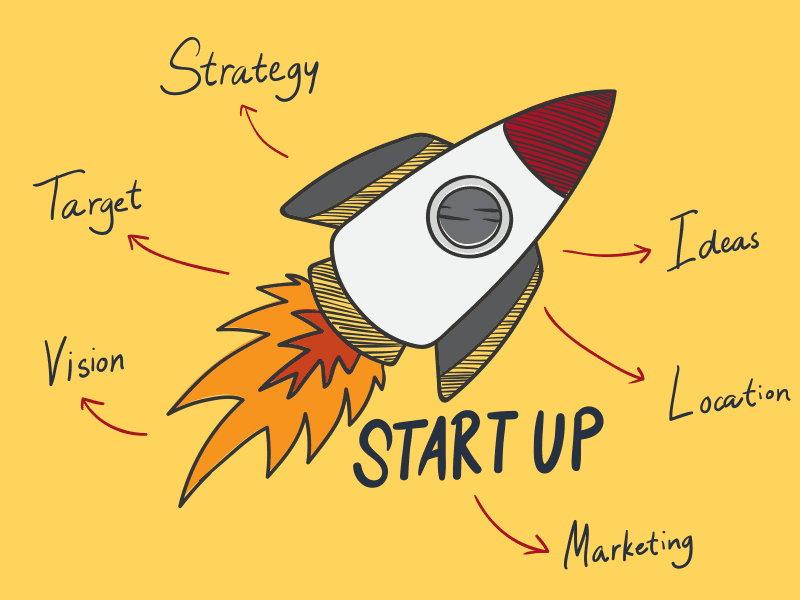4 Ways You Can Counter the Challenges to Your Startup
In the fast-paced and ever-evolving business environment of 2025, startups face an array of challenges that test their resilience, adaptability, and creativity. From navigating rapid technological changes to managing limited resources, the journey of building a successful startup is fraught with obstacles. Yet, these challenges also offer immense opportunities for growth and innovation for those who approach them with a proactive and strategic mindset.
Understanding and addressing these challenges is critical for ensuring long-term success. Startups need to remain flexible, resourceful, and focused on their core values while staying open to new ideas and market dynamics. By implementing well-thought-out strategies, startups can not only survive but thrive in today’s competitive landscape.
In this blog, we delve into four key areas where startups often encounter difficulties and provide actionable insights and real-world examples to help overcome them effectively.
4 Ways to Overcome Startup Challenges in 2025
1. Adapting to Rapid Changes
Startups often face unpredictable changes, especially in fast-evolving industries like technology and e-commerce. Market trends, customer preferences, and technological advancements can shift quickly, leaving businesses struggling to stay relevant. To counter this:
- Stay Agile: Build a culture of flexibility and adaptability. For instance, many startups in the gig economy have pivoted their services to cater to hybrid work models and digital-first consumer behaviors.
- Embrace Innovation: Regularly evaluate and reinvent your strategies. Companies like Netflix transitioned from DVD rentals to online streaming to stay ahead.
- Define Core Values: Establish and adhere to fundamental principles that guide decision-making. These values provide a consistent identity and voice for your brand, ensuring it remains meaningful amidst change.
Example: Spotify’s commitment to “innovation” and “customer focus” has helped it adapt to changing user preferences, leading to the development of features like Discover Weekly and AI-curated playlists.
2. Managing Limited Resources
Startups often operate with constrained budgets, limited manpower, and restricted access to resources. This requires efficient resource allocation and prioritization:
- Focus on Key Customers: Prioritize your initial customer base and provide exceptional service to build loyalty and generate positive word-of-mouth. For example, Airbnb focused on building trust with its early users by offering hands-on support and professional photography services.
- Streamline Operations: Use affordable tools like Trello for project management or HubSpot’s free CRM to manage sales and marketing effectively.
- Seek Strategic Partnerships: Collaborate with other startups or established businesses to share resources and reduce costs. For instance, Uber’s partnership with Spotify allowed both companies to enhance their user experience without significant resource strain.
Example: Zomato started as a simple restaurant directory and gradually expanded its offerings while maintaining a lean budget.
3. Balancing Growth with Capacity
Rapid growth can strain a startup’s resources and operational capacity. Overpromising and underdelivering can harm your reputation and drive customers to competitors:
- Set Realistic Expectations: Clearly communicate your capabilities and delivery timelines to customers. Tesla’s approach to preorders helps manage demand while keeping customers informed.
- Scale Gradually: Expand your offerings or geographic reach in manageable steps. For example, food delivery app Swiggy initially focused on a few cities before expanding nationwide.
- Implement Scalable Systems: Invest in systems and processes that grow with your business, such as cloud-based solutions or automated customer support tools.
Example: Slack maintained its product quality during its growth phase by focusing on customer feedback and scaling its infrastructure incrementally.
4. Building the Right Team and Culture
The foundation of any successful startup is its team. A cohesive and motivated team can overcome even the toughest challenges:
- Hire for Potential: Look beyond skills and focus on cultural fit, adaptability, and growth potential. Startups like Canva prioritize hiring individuals aligned with their mission and values.
- Foster a Positive Culture: Create an environment where employees feel valued and empowered. For example, Buffer’s transparent salary policy has fostered trust and engagement.
- Encourage Ownership: Give team members autonomy to make decisions and contribute ideas. Atlassian’s “ShipIt Days” encourage employees to innovate and take ownership of projects.
Example: Dropbox’s emphasis on collaboration and employee satisfaction has been a key factor in its sustained success.
Final Thoughts: Startup Challenges
The path to success for startups in 2025 is filled with startup challenges, but it is also rich with opportunities for those who approach these obstacles with resilience, adaptability, and creativity. By staying agile, managing resources effectively, scaling growth thoughtfully, and fostering a strong, cohesive team culture, startups can navigate the ever-changing landscape of business and carve out a space for themselves in the market.
The ability to embrace startup challenges, rather than shy away from them, is often what differentiates successful startups from those that fall short. With a strategic mindset and a commitment to innovation, startups can not only overcome adversity but emerge stronger, more resilient, and poised for long-term success.
Startup Challenges
In addition to the common hurdles of adapting to rapid changes, managing limited resources, balancing growth with capacity, and building the right team, startups also face several other challenges in 2025:
- Customer Acquisition and Retention: In a saturated market, attracting and retaining customers remains a significant challenge. Startups must employ creative marketing strategies, build strong relationships, and offer exceptional value to stand out.
- Competition: With the rise of new technologies and business models, startups must contend with fierce competition from both established companies and other emerging startups. Differentiating their offerings and maintaining a competitive edge is key to survival.
- Funding and Cash Flow: Securing adequate funding and managing cash flow are ongoing concerns for most startups. Without a steady financial base, businesses risk stalling or being forced to make decisions that may hinder growth.
- Regulatory Compliance: Navigating complex regulations and compliance requirements, particularly in industries like tech, healthcare, and finance, can be daunting for startups. Failing to comply can result in costly fines or legal setbacks.
Despite these additional challenges, the most successful startups find ways to turn these obstacles into opportunities for innovation, strategic growth, and lasting success.
About CO-OFFIZ : Coworking Space in Delhi-NCR
Co-Offiz is a leading provider of coworking spaces in Delhi-NCR tailored for young professionals, startups, freelancers, and entrepreneurs. We emphasize a collaborative work culture that enhances productivity while providing a hassle-free and aesthetically pleasing environment based on Vastu principles.
Our modern amenities include high-speed internet, unlimited tea/coffee, breakout zones, power backup, and CCTV security. Our vibrant meeting rooms feature LED TV projectors and ergonomic chairs, fostering an ideal workspace.
With locations in in Preet Vihar (East Delhi), Janakpuri (West Delhi), Netaji Subhash Place (North Delhi), Noida Sec-63 and Gurugram Sec-58, we offer flexible seating, dedicated desks, and private cabins at competitive prices, all conveniently located near metro stations for easy access.


